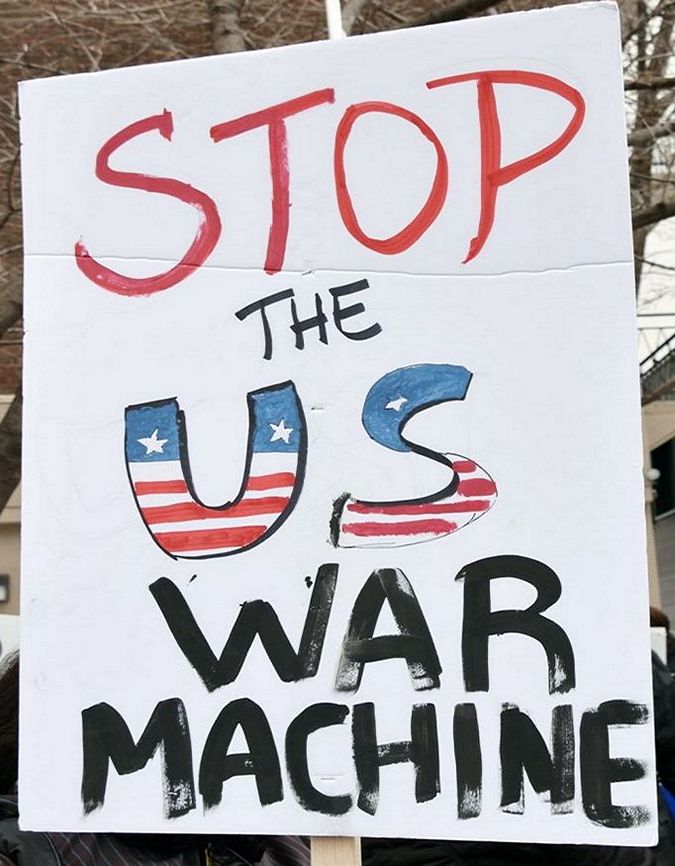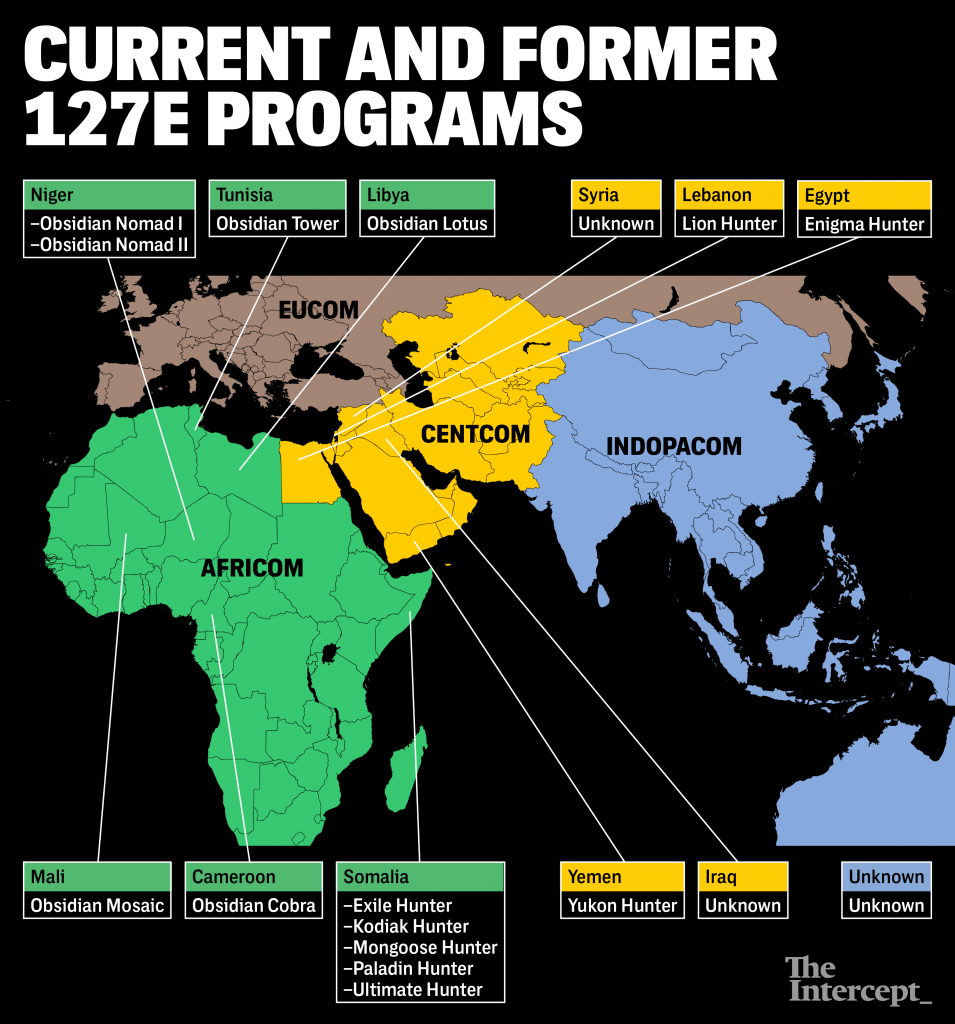In the News July 14
No to U.S. War Preparations!
U.S. Special Military Operations Worldwide
A freedom of information request in the U.S. has revealed a heavily redacted report on the global activities of U.S. Special Operations forces. The Intercept news service published excerpts from the report and interviews it conducted revealing U.S. Special Forces are actively yet secretly engaged in wars against the peoples of the world.
 Legally the U.S. military must obtain permission from the U.S. government to wage war against sovereign nations and peoples. To circumvent this necessity and to obtain funding that cannot be easily traced, the Pentagon uses a classified 127e authority obtained from Congress dating back to the U.S. invasion of Afghanistan in 2001. The Intercept obtained documents and conducted interviews that show 127e gives funding authority to the Pentagon to conduct military attacks anywhere in the world. The attacks, murder and destruction are then mostly attributed to unknown assailants and terrorists.[1]
Legally the U.S. military must obtain permission from the U.S. government to wage war against sovereign nations and peoples. To circumvent this necessity and to obtain funding that cannot be easily traced, the Pentagon uses a classified 127e authority obtained from Congress dating back to the U.S. invasion of Afghanistan in 2001. The Intercept obtained documents and conducted interviews that show 127e gives funding authority to the Pentagon to conduct military attacks anywhere in the world. The attacks, murder and destruction are then mostly attributed to unknown assailants and terrorists.[1]
The Intercept spoke with Joseph Votel, a retired four-star Army general who headed both Special Operations Command and Central Command overseeing U.S. attacks in west Asia and north Africa. Votel confirmed the existence of previously unrevealed 127e sanctioned and funded attacks in Egypt where U.S. Special Operations forces partnered with the Egyptian military in the Sinai Peninsula; in Lebanon where it funded, trained and fought alongside a Lebanese attack force called the G2SF; in Syria and Yemen. Another unnamed defence official said an earlier version of the 127e program had also been in place to fund and sanction assaults in Iraq and Afghanistan.
The U.S. military is using 127e routinely to provide funds and legal authority to engage in fighting worldwide. Another set of documents obtained by The Intercept reveals a 127e operation in Tunisia, code-named Obsidian Tower, where the U.S. military was engaged in combat in 2017 against unnamed forces.
The Intercept writes, “Basic information about these (Special Forces) missions — where they are conducted, their frequency and targets, and the foreign forces the U.S. relies on to carry them out — are unknown even to most members of relevant congressional committees and key State Department personnel.
“Through 127e (127-echo), the U.S. arms, trains, and provides intelligence to foreign forces. But unlike traditional foreign assistance programs, which are primarily intended to build local capacity, 127e partners are then dispatched on U.S.-directed missions, targeting U.S. enemies to achieve U.S. aims. ‘The foreign participants in a 127-echo program are filling gaps that we don’t have enough Americans to fill,’ a former senior defense official involved with the program told The Intercept. ‘If someone were to call a 127-echo program a proxy operation, it would be hard to argue with them.’
“Retired generals with intimate knowledge of the 127e program — known in military parlance as ‘127-echo’ — say that it is extremely effective in targeting militant groups while reducing risk to U.S. forces.”
 The 127e was first authorized under a different name in 2005. It later came to light after four U.S. soldiers were killed in combat in Niger, west Africa in 2017. Other reports have revealed U.S. soldiers in combat alongside mercenaries in multiple African countries such as in Cameroon committing what has been termed “notorious abuse and mass atrocities.”
The 127e was first authorized under a different name in 2005. It later came to light after four U.S. soldiers were killed in combat in Niger, west Africa in 2017. Other reports have revealed U.S. soldiers in combat alongside mercenaries in multiple African countries such as in Cameroon committing what has been termed “notorious abuse and mass atrocities.”
The Intercept had no success in obtaining information and comments from the White House and Pentagon on the use of “U.S. commandos outside conventional war zones.” The Pentagon’s SOCOM (Special Operations Command) spokesperson Ken McGraw told The Intercept bluntly, “We do not provide information about 127e programs because they are classified.”
The Intercept says critics of 127e warn that secretly funded and authorized military operations around the world pose “the risk of unanticipated military escalation” and “may amount to an unlawful use of force.
“Because most members of Congress — including those directly responsible for overseeing foreign affairs — have no input and little visibility into where and how the programs are run, 127e-related hostilities can lack the congressional authorization required by the U.S. Constitution,” argued Katherine Ebright, counsel at the Brennan Center for Justice.
“‘There’s reason to suspect the Department of Defense has used 127e partners to engage in combat beyond the scope of any authorization for use of military force or permissible self-defense,’ Ebright told The Intercept.”
The military, militarized police forces and private mercenaries underscore the military aspect of government of police power, the militarization of the economy, and total breakdown of a civil society where governments are expected to uphold the public good. Today we have governments of impunity where the prerogative powers of the executive itself, not just the military and police, are broadly used without concern about the issue of legitimacy.
Anti-war governments are needed to stop paying the rich and increase investments in social programs while all troops must be brought home and NATO must be dismantled.
Note
1. The Intercept writes, “The origins of the 127e program can be traced back to the earliest days of the U.S. war in Afghanistan, as commandos and CIA personnel sought to support the Afghan Northern Alliance in its fight against the Taliban.
“Army Special Operations Command (SOCOM) soon realized that it lacked the authority to provide direct payments to its new proxies and was forced to rely on CIA funding. This prompted a broader push by SOCOM to secure the ability to support foreign forces in so-called missions, a military corollary to the CIA’s use of militia surrogates.
“First known as Section 1208, the authority was also deployed in the early years of the Iraq invasion, according to a former senior defense official. It was ultimately enshrined in U.S. law under U.S.C. Title 10 § 127e.
“127e is one of several virtually unknown authorities granted to the Defense Department by Congress over the last two decades that allow U.S. commandos to conduct operations on the fringes of war and with minimal outside oversight.
“While 127e focuses on ‘counterterrorism,’ other authorities allow elite forces — Navy SEALs, Army Green Berets, and Marine Raiders among them — to conduct clandestine intelligence and counterintelligence operations or assist foreign forces in irregular warfare, primarily in the context of so-called great power competition (such as the current U.S. proxy war in Ukraine against Russia — ed note.)”
The Intercept writes, “The lack of oversight (of SOCOM) across levels of the U.S. government is in part the result of the extreme secrecy with which defense officials have shielded their authority over the program — and of the scant pushback they have faced. ‘It’s the State (Department) not knowing what they don’t know, so they don’t even know to ask. It’s the ambassadors being sort of wowed by these four-star generals who come in and say, ‘If you don’t let us do this, everyone’s going to die,’ the government official said. ‘DOD views this as a small, tiny program that doesn’t have foreign policy implications, so, ‘Let’s just do it. The less people get in our way, the easier.’
“Those programs include an authority, known as Section 1202, that first appeared in the 2018 National Defense Authorization Act and provides ‘support to foreign forces, irregular forces, groups, or individuals’ that are taking part in irregular warfare and are explicitly focused on so-called near-peer competitors.
“Congress has also authorized the secretary of defense to ‘expend up to $15,000,000 in any fiscal year for clandestine activities for any purpose the Secretary determines to be proper for preparation of the environment for operations of a confidential nature’ under 10 USC § 127f, or ‘127 foxtrot.’ Section 1057 authority similarly allows for intelligence and counterintelligence activities in response to threats of a ‘confidential, extraordinary, or emergency nature.’
“‘This has been sort of the story for a lot of these DOD-run programs,’ said Stephen Semler, co-founder of the Security Policy Reform Institute, a grassroots-funded U.S. foreign policy think tank. ‘The Special Operations community likes autonomy a lot. They don’t like going through bureaucracy, so they always invent authorities, trying to find ways around having their operations delayed for any reason. The problem is this stuff is so normalized,’ he added. ‘There should be more attention paid to these train-and-equip authorities, whether it’s special forces or DOD regular, because it’s really kind of a PR-friendly way to sell endless war’.”
For The Intercept report click here.
TML Daily, posted July 14, 2022.

|

|

